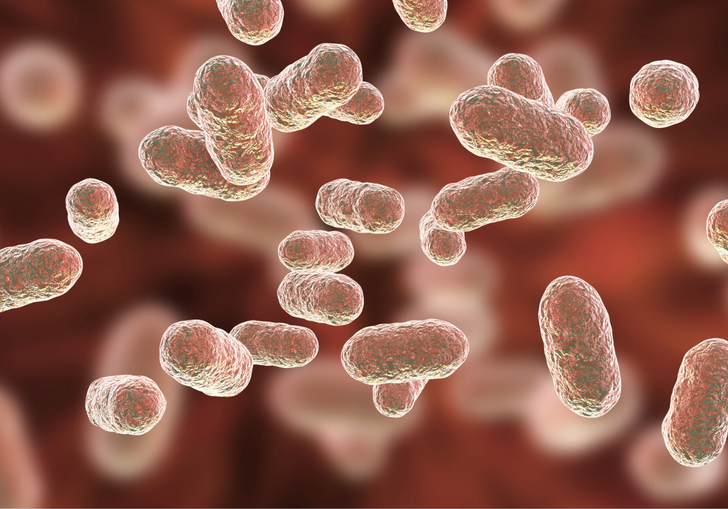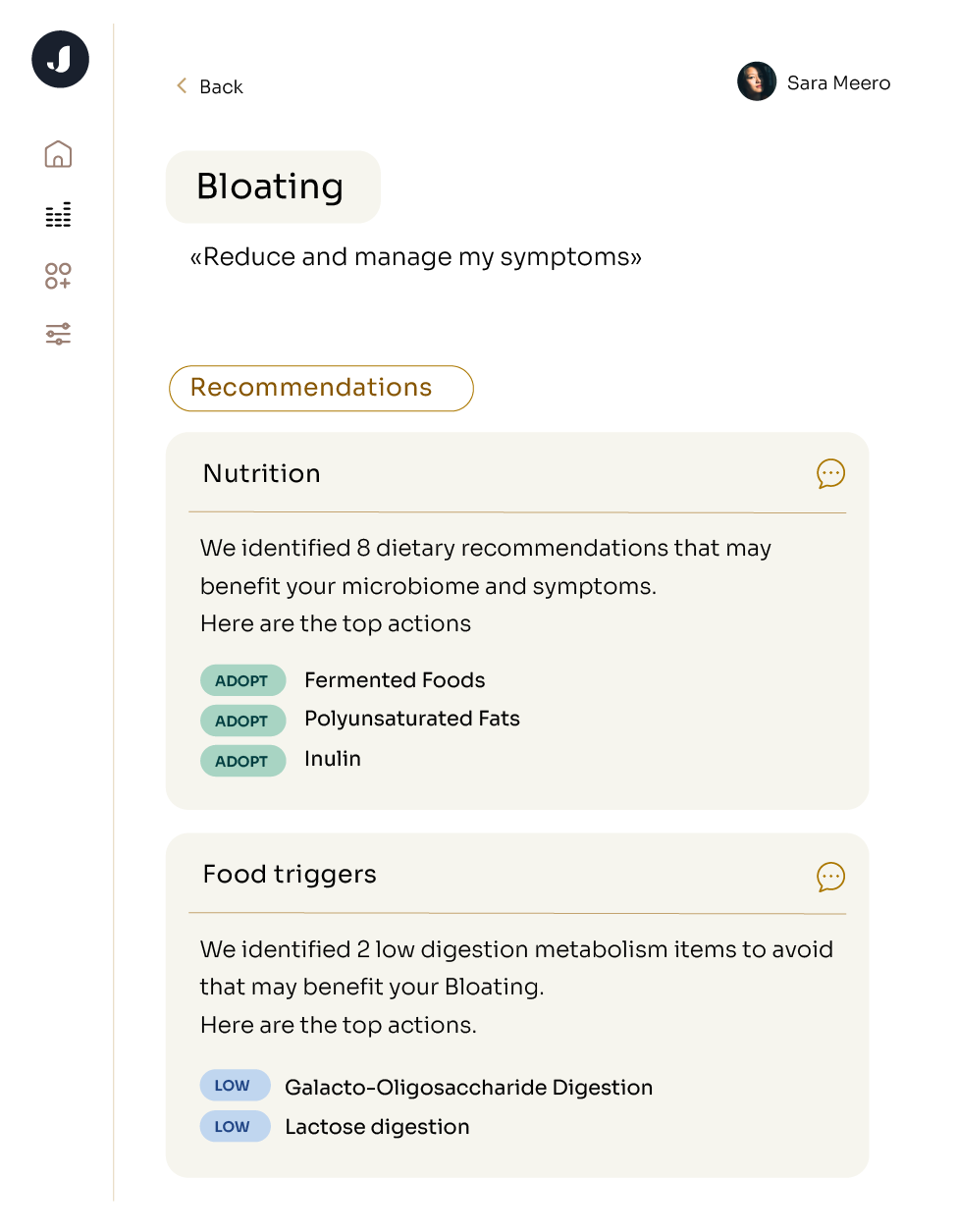When did you last check in on your gut health? For many people, it was the last time they got sick. However, recent research suggests that what happens in the gut is mirrored across the body, appearing as skin issues, brain fog, or painful joints - meaning that your gut could be sending you signals even before you realize.
Proactively maintaining your gut health can benefit more than just digestion. In this article, we’ll cover the warning signs of an unhealthy gut and how subtle lifestyle changes in sleep, breastfeeding, stress and more can impact the microbiome.
You know that digestive issues like bloating, gas, cramping, and constipation can all be signs of gut disruption, but the gut speaks through other organ systems, too. If you’re experiencing any of the below, you might want to check in on your microbiome health.
The gut is critical for converting food into energy, so feeling perpetually tired can be a sign that something is off in your digestive system.
Many of your neurotransmitters (chemicals that convey signals in the brain) are created in the gut. Disrupted signaling by these chemicals can lead you to feel anxious, on edge, depressed, or numb and could be a sign that your gut needs attention.
Healthy skin relies on a fresh, varied diet high in vitamins, minerals, and healthy fats. If you’re not eating enough of these foods - or if you are, but your microbiome is unable to absorb these important nutrients - it might show on your skin through acne, psoriasis, eczema, or other conditions.
Are foods like gluten, dairy, or eggs giving you GI trouble? More than 6% of Americans experience food allergies or sensitivities, but these conditions can develop over time and change with the composition of your gut. Experiencing a sudden change in reaction to certain foods could be an early sign of an allergy or a disruption to your gut flora.
Conditions like irritable bowel syndrome, Crohn’s disease, and leaky gut syndrome often appear with clear digestive symptoms like gas, bloating, and diarrhea. Thanks to modern sequencing methods, we now know that these conditions aren’t isolated to human tissue - they also appear with telltale patterns in the gut microbiome. In addition to the digestive conditions, you may not know that specific microbiome patterns have also been identified in Parkinson’s disease, anxiety, and cancers, meaning that individuals with these conditions also have unique patterns of microbial abundance and potential dysbiosis. So, if you’re struggling with digestive issues, you may want to investigate what your microbiome has to say.
Your gut feeds not only your human cells, but also your microbiome. Eating for a healthy gut looks different for everyone because no two gut microbiomes are exactly the same. While there are some universal foods to avoid (artificial sweeteners, highly processed snacks and soda aren’t benefiting anyone’s gut) the optimal diet can be highly individualized. Generic advice - eat a diet high in fiber and vitamins - can leave you wondering what should actually go on your plate: what kind of fiber? What kind of vitamins?
The best way to optimize is to get to know your own microbiome. Understanding the current composition of your gut and learning what the science says can give you a baseline, and from there, the latest research helps to illuminate the interventions that can shift your microbiome in a positive direction.
Breastfeeding your baby is one of the best ways to help establish their gut microbiome. In addition to fat and protein, which help your baby grow, breast milk is full of oligosaccharides which help to nourish the infant microbiome. Even if you’re not breastfeeding, you might want to spend equivalent time holding your baby - the extended closeness and skin contact known as ‘kangaroo care’ has been shown to benefit both mother and infant.
Exercise benefits most body systems, including the gut. Moving your body helps to stimulate digestion and reduce constipation. But, the effects of aerobic exercise on your gut microbiome are different from those of strength training or even yoga. So, how do you decide what is best for you? Jona’s microbiome profiling kit can help you understand the specific categories of bacteria in your gut and the exercise regimen that will provide the greatest benefit.
The gut-brain axis is an information highway linking digestive and mental health. Your brain and gut are constantly exchanging information about what you ate, how you feel, and what your body needs next. As a result, mental stress can impact your gut, where your microbiome helps protect your body from stress-related inflammation. Gut microbes accomplish this by leveraging your diet in creative ways: for example, gut microbes use the polyphenols found in dark chocolate or green tea to counter reactive molecules known as free radicals, which damage body tissue. You already know that reducing stress benefits your overall wellness, but a healthy gut can actually help you diffuse stress more effectively.
Your digestive health needs rest in order to function properly. Research has demonstrated that conditions like insomnia may co-occur with specific patterns of gut dysbiosis, and chronic fatigue from insufficient sleep can start a vicious cycle that eats away at your gut health. Additionally, there is evidence for interplay between inflammatory cytokines mediated by the gut microbiome and excessive daytime sleepiness. Good sleep hygiene (including setting a regular sleep schedule and developing a calming bedtime routine) can also support gut health.
Probiotics are live bacteria that you consume on fermented foods or with supplements. They can be found naturally in certain foods, such as yogurt, kefir, kimchi, sauerkraut and miso. In addition to dietary sources, probiotic supplements are available. Research on the safety, dosage, efficacy, and long-term effects of probiotic supplements is ongoing, and there is meaningful debate in the scientific community about all of the above. It’s important to note that probiotic supplements vary widely and may not be right for everyone, particularly young children.
Antibiotics have revolutionized our treatment of infections, but part of their power is in their broad-strokes approach. Penicillin, amoxicillin, and others can wipe out much of the good bacteria in your gut along with the pathogens, in some cases leaving you with digestive issues and diminished immunity….which lead to more infections and more antibiotics.
Taking probiotics after antibiotics has recently been proposed as a means of ‘reestablishing’ the gut microbiome after it was wiped out. Surprisingly, evidence is accumulating for an alternative hypothesis - that probiotics after antibiotics can cause more harm than good. Look out in our upcoming blog posts for a deep dive into this fascinating topic.
Improving your gut health will look different for everyone. Aside from the basics (eating a nutrient-rich diet and getting enough water, exercise, and sleep), what’s best for your body? You might want to try keeping a journal of what you eat, how you slept, and what was on your mind that day to identify triggers, or foods that agree well with you. (If you use a wearable device like a smartwatch, you may already be doing some of these!)
However, to get really granular on the microbiome level, a microbiome test and analysis is the best way to level up. Shotgun metagenomic approaches are best for this to provide an unbiased look into the full breadth of organisms in your gut, and measuring it against the research enables you to understand your associations and next steps in depth.
Many minor digestive issues can be managed with lifestyle changes and dietary adjustments, but there are certain symptoms that warrant a visit to your healthcare provider. Seek medical attention for any of the below.
Significant and unexplained weight loss could be a sign of a digestive disorder or malabsorption issues.
Seeing blood in your stool could indicate bleeding in the digestive tract, which may be caused by conditions such as hemorrhoids, ulcers or even colon cancer.
Any sudden or significant changes in your bowel habits, such as the appearance of very dark or pale stools, persistent diarrhea or constipation, or changes in stool frequency, should be discussed with a healthcare provider.
Ongoing fatigue and low energy levels, even with sufficient sleep and a healthy diet, can be indicative of an underlying health issue. Since the gut plays a role in nutrient absorption, chronic fatigue could be related to poor gut health.
While not always directly related, certain skin conditions like eczema, acne, or rosacea can sometimes be linked to gut health issues. If you've tried various treatments without success, discussing your symptoms with a dermatologist or gastroenterologist could provide valuable insights.
If you have concerns about your gut health, it's best to consult with a healthcare professional. They can perform a thorough evaluation, order tests if necessary, and provide personalized recommendations to address your specific symptoms.





